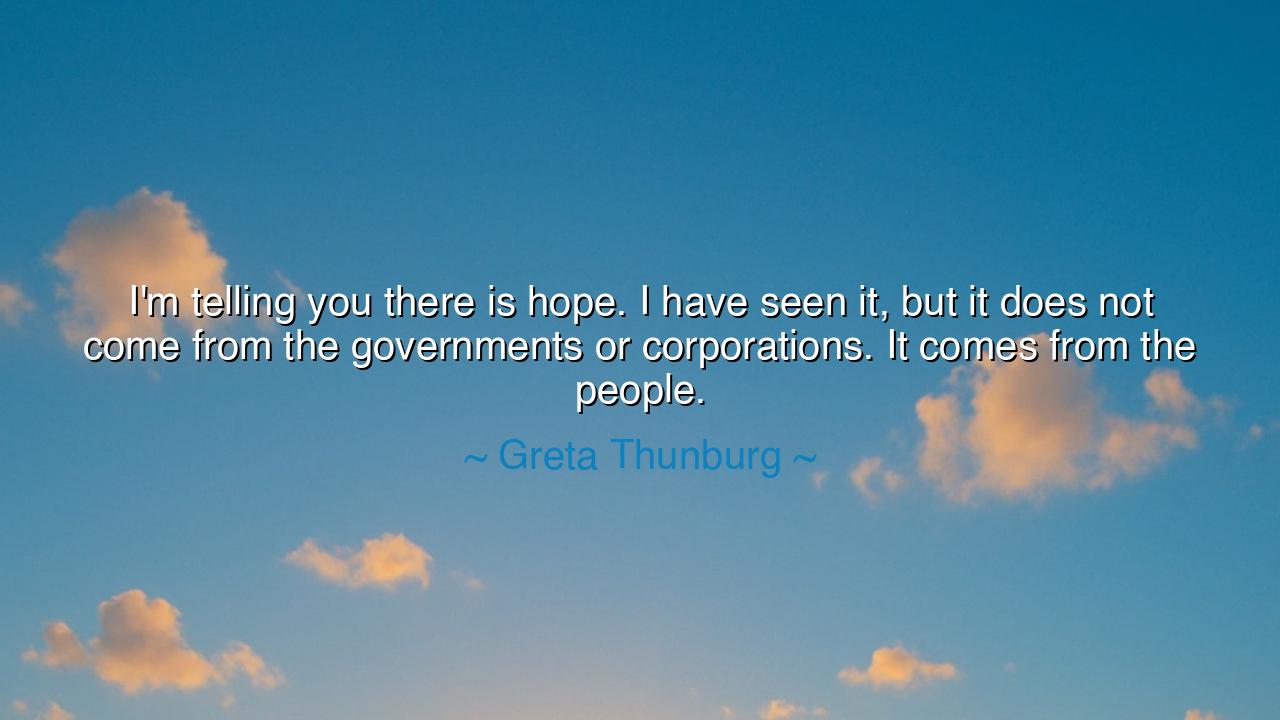
I'm telling you there is hope. I have seen it, but it does not
I'm telling you there is hope. I have seen it, but it does not come from the governments or corporations. It comes from the people.






“I’m telling you there is hope. I have seen it, but it does not come from the governments or corporations. It comes from the people.” Thus spoke Greta Thunberg, the young voice of the Earth, whose cry has pierced the noise of indifference with the sharpness of truth. Her words, though simple, carry the weight of an ancient wisdom — that hope is not born from power, nor wealth, nor the halls of authority, but from the hearts of ordinary men and women who dare to care. In an age when the air itself grows heavy with smoke and the seas rise in silent fury, her declaration is both a warning and a promise: that salvation lies not above us, but among us.
Thunberg’s words emerged from her movement for climate justice, born from a single act of defiance — a young girl standing alone before the Swedish parliament, holding a sign that read “School Strike for Climate.” Her quiet protest, at first ignored, became a flame that spread across nations. Students left their classrooms; workers marched beside them; voices rose from every corner of the world. From this uprising of the young came the proof of her claim: that the people, when awakened by conscience, can move the earth itself. Governments hesitated, corporations made promises wrapped in profit, but the people — the farmers, the teachers, the children — carried forward the torch of hope.
This truth is as old as civilization. For every empire that has fallen, it was not kings who rebuilt, but the common heart that refused to die. When tyrants ruled Rome, it was the philosophers and the martyrs who kept the spirit of liberty alive. When slavery darkened the New World, it was the enslaved themselves, and those who walked beside them, who lit the path to freedom. When apartheid scarred South Africa, it was not the might of governments but the unyielding faith of the people, led by voices like Nelson Mandela and Desmond Tutu, that broke the chains. Thunberg’s message stands in this same lineage — the ancient belief that the strength of humanity does not flow from its rulers, but from the countless souls who refuse to surrender their moral fire.
In saying that hope does not come from governments or corporations, Thunberg does not speak of hatred or rejection, but of realism. Power, she reminds us, is too often tangled in fear, greed, and comfort. The powerful act when pressured; the people act when moved by truth. Hope, therefore, is not a policy written in marble halls — it is an awakening that begins in kitchens, in classrooms, in the trembling hands of those who believe that even a small act of courage matters. Hope is born from participation, from the humble conviction that each of us has a duty to protect what is sacred.
Yet Greta’s hope is not blind optimism. It is hope forged through struggle, tempered by despair and lit by action. She has looked upon the ice melting, the forests burning, and the leaders talking while doing little — and still she believes. This is not the hope of comfort; it is the hope of resistance, the kind that burns brighter the darker the night becomes. It is the same hope that kept Mahatma Gandhi walking barefoot toward the salt fields, the same hope that led Rosa Parks to remain seated when the world demanded she stand. It is the hope that does not wait for permission, but acts in faith that humanity can rise above itself.
Her words challenge us, each one who hears them, to ask: Where does my hope come from? Do I wait for others to change the world, or do I begin with my own hands, my own voice, my own choices? For every action — a tree planted, a lie refused, a kindness offered — is a seed of hope. The empires of greed and pollution may seem vast, but the ocean too is made of drops, and when those drops move together, they form a tide that no power can resist. This is the sacred truth of Greta’s message: that hope is collective, and that in unity, the powerless become unstoppable.
So, my child, take this teaching to heart. Do not look to leaders as saviors, nor wait for permission to begin. Be the hope you wish to see, and join hands with others who do the same. Speak truth even when it shakes your voice. Act boldly even when the world tells you it is useless. For hope, as Greta Thunberg reminds us, is not a gift from the mighty — it is the birthright of the awake. It is the light that grows wherever compassion and courage meet. And though despair may always whisper, hope, once kindled in the people, becomes a fire that even the darkness cannot extinguish.






AAdministratorAdministrator
Welcome, honored guests. Please leave a comment, we will respond soon